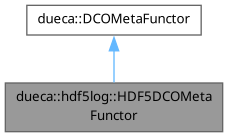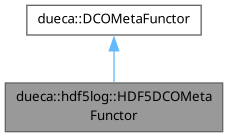dueca::hdf5log::HDF5DCOMetaFunctor Class Referenceabstract
metafunctor to access DCO HDF5 facilities. More...
#include <HDF5DCOMetaFunctor.hxx>
Inheritance diagram for dueca::hdf5log::HDF5DCOMetaFunctor:

Collaboration diagram for dueca::hdf5log::HDF5DCOMetaFunctor:

Public Member Functions | |
| HDF5DCOMetaFunctor () | |
| Constructor. | |
| ~HDF5DCOMetaFunctor () | |
| Destructor. | |
| virtual const H5::DataType * | operator() () |
| Get a HDF5 datatype; not always defined! | |
| virtual HDF5DCOWriteFunctor * | getWriteFunctor (std::weak_ptr< H5::H5File > file, const std::string &path, size_t chunksize, const std::string &label, const dueca::DataTimeSpec *startend, bool compress=false, bool writeticks=true)=0 |
| Get an arrayed HDF5 channel reading & file writing functor. | |
| virtual HDF5DCOReadFunctor * | getReadFunctor (std::weak_ptr< H5::H5File > file, const std::string &path, bool readticks=true)=0 |
| Get an HDF5 channel writing & file reading functor. | |
 Public Member Functions inherited from dueca::DCOMetaFunctor Public Member Functions inherited from dueca::DCOMetaFunctor | |
| DCOMetaFunctor () | |
| Constructor. | |
| virtual | ~DCOMetaFunctor () |
| Destructor. | |
Detailed Description
metafunctor to access DCO HDF5 facilities.
Two modes of interaction
- Get a datatype for writing the whole DCO object as a compound HDF5 datatype. Note that this only works for DCO objects with fixed-length strings, fixed length arrays (fixvector) and variable length arrays (limvector, varvector). DCO with fancier stuff like variable length strings, and stl containers do not allow this, and throw an exception.
Get a functor for reading a channel and writing the data into hdf5 format. This creates an hdf5 dataset for each variable in the DCO object. Again, limitations apply, the variables may not be dco objects for which a datatype cannot be obtained as described above. The hdf5 datasets are written as follows:
path/tick - for DUECA tick valuespath/data/<member1> - first data memberpath/data/<membern> - datasets for all data membersfor the future, if the DCO has a parent class, the structureis deepened further; note that currently the parent data is notwritten.path/<Parent> - ONLY for DCO with parent classpath/<Parent>/data - all the members of this parentand possibly:path/<Parent>/<Parent2>/data etc.
Member Function Documentation
◆ getWriteFunctor()
|
pure virtual |
Get an arrayed HDF5 channel reading & file writing functor.
- Parameters
-
file HDF5 file on which to write path Base path for writing the data. chunksize Size of data chunks. label Label to be written to the file startend Pointer to a time spec controlling run/pause in logging compress You can guess writeticks If true, time is also logged
- Returns
- A functor object, that can be accepted by a channel token to apply the operation, in this case writing data to HDF5 file
◆ getReadFunctor()
|
pure virtual |
Get an HDF5 channel writing & file reading functor.
- Parameters
-
file HDF5 file from which to read. path Base path for reading the data. readticks If true, time also read from the file
- Returns
- A functor object, that can be accepted by a channel token to apply the operation, in this case writing data to HDF5 file
The documentation for this class was generated from the following file:
- /home/abuild/rpmbuild/BUILD/dueca-4.2.5-build/dueca-4.2.5/hdf5utils/HDF5DCOMetaFunctor.hxx